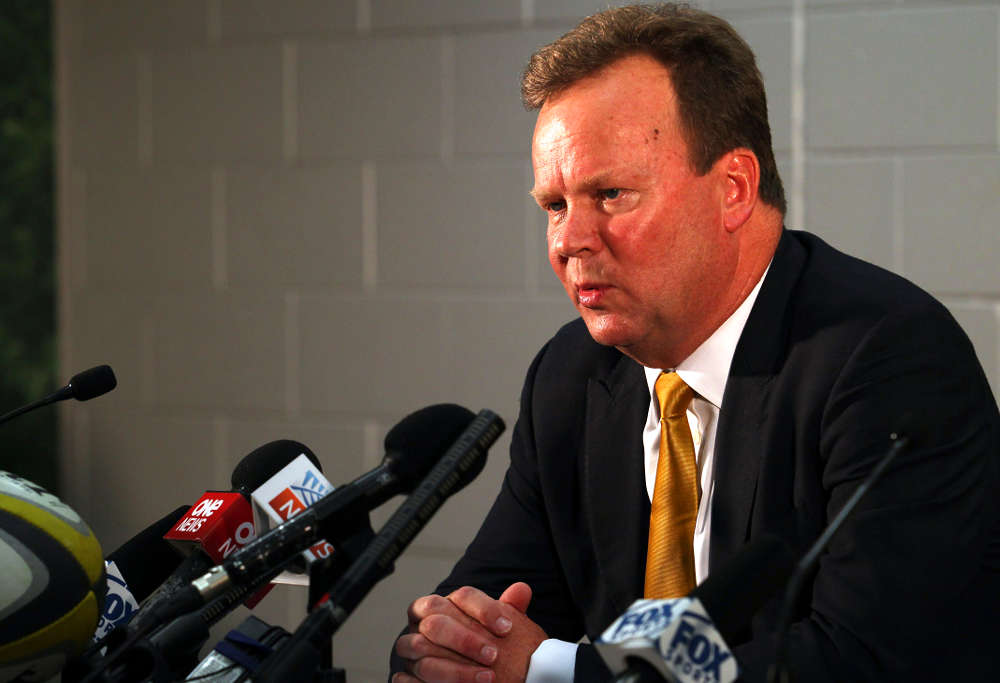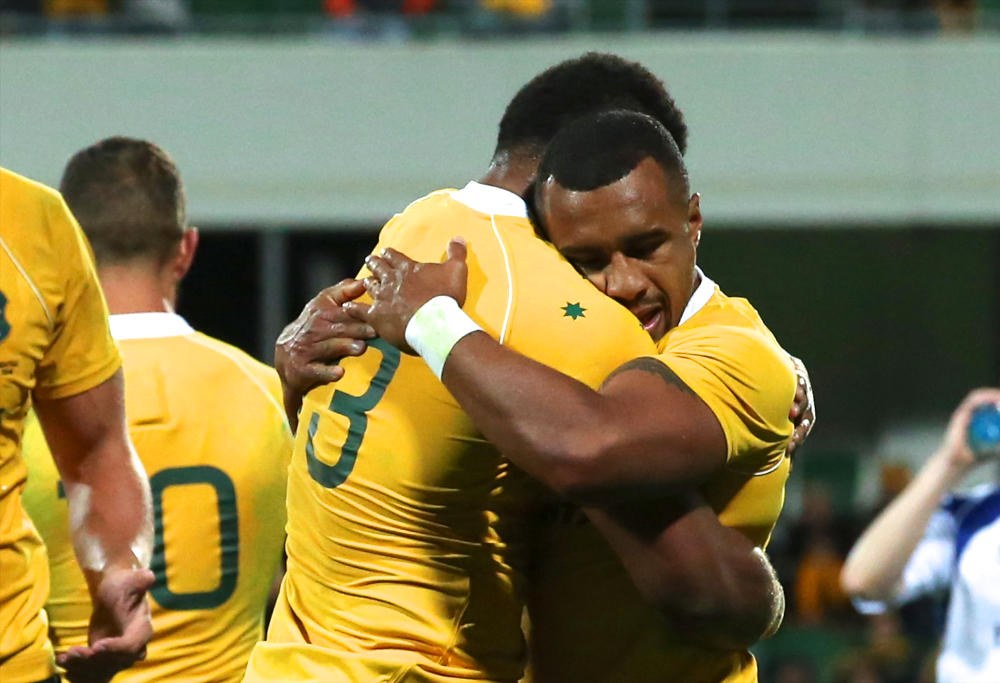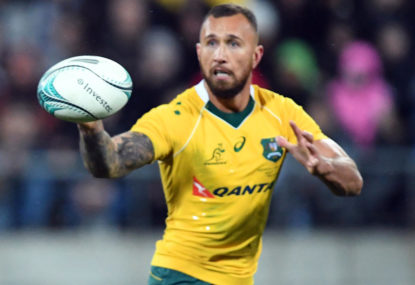I am writing this in Barcelona. Well, someone has to have a holiday there.
But thanks to the marvels of modern technology, I have been able to keep up with some of the rugby news.
A story that grabbed my attention was the complaint by Ben Ryan, the coach of the Fijian Sevens Olympic champions, that Australia and New Zealand are stealing players from the Pacific Islands national sides.
Ryan is English. And he is, unfortunately, repeating the nonsense that UK rugby journalists have been regurgitating since the Rugby World Cup 1987.
It goes that the success of the Wallabies and the All Blacks (especially) is directly related to the raids they have made on Islanders who have been seduced by the Australasian dollars to give away the chance of representing their home nation.
Steve Tew, the chief executive of the New Zealand Rugby Union, nailed this nonsense with a typically forthright and accurate statement.
The majority of All Blacks with an Islander background are born in New Zealand, he told the New Zealand rugby media. Moreover, New Zealand returns Test players to the countries like Tonga and Samoa, even though they were born and bred in New Zealand.
In the last two Rugby World Cup tournaments, for instance, well over 60 New Zealanders played for teams other than the All Blacks. New Zealanders made up virtually the entire complement of the Samoan and Tongan squads.
A fine irony for Stephen Jones and the other British rugby media types who espouse the doctrine of the stealing of the Islanders is that the present captain of England, Dylan Hartley, was born and bred in the rugby culture in New Zealand. England, in fact, had more players born out of England playing in the Rugby World Cup 2015 tournament than Australia or New Zealand did with their outside players. Fancy that!
Tew went on to the heart of the matter, though, with his accusation that the French rugby clubs recruited young players from the Pacific Islands, played them in the second tier clubs for subsistence wages, promoted a handful of players to the first tier clubs and then callously dumped the youngsters who do not make the cut.
This rugby form of rugby black-birding is one of the most disgraceful practices in modern sport. Yet the practice has continued in Europe (and France particularly) for many years with the connivance of the rugby authorities.
Moreover, there hasn’t been much of outcry from the British rugby media. I say shame on them for their silence.
There is something else (on a much less scale, admittedly) that is worrying on this matter
Where was Bill Pulver defending the interests and integrity of Australian rugby, the way Tew did for New Zealand interests?

This silence of Pulver is even more astounding given the fact that the Wallaby squad to tour South Africa and Argentina was announced at the same time as Ryan’s nasty attack.
That squad has 12 players with a Pasifika background, most of them born in Australia and those who weren’t (Quade Cooper, for instance) got their major rugby experience in Australia.
Just to inform Pulver about the diversity in the Wallabies, here are these Pasifika players in Michael Cheika’s touring squad: Allan Alaalatoa, Quade Cooper, Israel Folau, Will Genia, Sekope Kepu, Samu Kerevi, Tevita Keredrani, Tolu Latu, Sefania Nauvalu, Scott Sio, Henry Speight, Lopeti Timani.
I sometimes get the feeling that Bill Pulver knows nothing about what is happening in Australian rugby. He goes on about the need to have more diversity in Australian rugby. He attacks (without justification) the traditional rugby schools and clubs for not promoting diversity. Then when a squad with great diversity in it is announced, he ignores this chance.
Pulver’s silence on Ben Ryan’s nonsense is an example of a chief executive who does not seem to be interested in protecting the interests of rugby game in Australia in a way that makes sense to the code’s supporters.
Later last week there was yet another instance of Pulver’s unwillingness to engage with supporters.
The schedule for the 2017 Super Rugby was announced by SANZAAR. It was a same old, same old scheduling mess. This provoked a (justified) response from Paul Cully in The Sydney Morning Herald that he was finding the complexity of the conference system so bewildering that he was losing his love of the tournament.
Steve Tew, with the interests of supporters in his mind, made a forceful statement about the overly-complicated schedule.
He criticised the ARU and the SARU for rejecting a New Zealand Rugby Union suggestion that the finals should follow a simple, uncomplicated, easily understood one to eight system, with the top team playing the bottom team, the second team playing the seventh team and so on.
Tew made the point that the conference system in place for Super Rugby is so complicated when it comes to working out who plays whom from which conference in the finals that supporters lose interest in the tournament.
The straight one to eight system would allow supporters to follow their teams easily by following their accumulated points, rather than having to calculate who are the conference leaders and the complications of which team has a home final.
Tew was right to slam the ARU for supporting the SARU on this matter.
The fact of the matter is that virtually everything that has been stuffed up the Super Rugby tournament over the years can be attributable to the bloody-mindedness of South African officials.
The obvious example of this bloody-mindedness has been the SARU’s insistence that South Africa has six Super Rugby teams when the extra team, the Kings, makes the tournament lop-sided and virtually impossible to schedule in a fair way.
The introduction of the Kings has meant, in turn, that South Africa has two conferences, each of which has its own designated final. The Australian and New Zealand conferences have a single designated home final each. What a mess! And an unfair mess, at that.
Where is Bill Pulver’s explanation to the Australian rugby public justifying his rejection of a finals system that would take some of the complexities out of understanding the Super Rugby formats?
And a further question to Pulver, on another matter: Is he happy with the way the Giteau Law has been used this season by coach Michael Cheika?

It needs to be remembered that Pulver was opposed to the Giteau Law requirements. He was forced into accepting it by Michael Cheika and by players’ managers.
In my view, the experiment has been a failure for Cheika’s Wallabies in 2016. (Click to Tweet)
Admittedly, one of the Giteau Law four, Will Genia, has played splendidly throughout The Rugby Championship Test. But the other three French veterans, Matt Giteau, Adam Ashley-Cooper and Drew Mitchell have contributed nothing to improving the squad, aside from some off-field bluster about their passion for the Wallabies jersey.
Ashley-Cooper played two undistinguished Tests, Giteau played 12 minutes and Mitchell played 11 minutes before they were all packed off back to France.
What a waste of time for the Wallabies! And what a waste of space within the Wallabies squad for younger players like Nick Frisby, now returned to the squad for the tours to South Africa and Argentina.
Now that the older, French veterans have left the squad, Cheika has had some space to bring in players who should have been there in the first place.
Cheika has the chance now to play Reece Hodge at inside centre and bring in some pace on the wing with, say, Henry Speight taking Mitchell’s spot.
James Hanson should have been given a place in the squad from the beginning. Surely, too, Lopeti Timani will be given a start at number 8 now that David Pocock is out of the squad.
There just seems to be a younger, fresher look to the squad that Cheika is taking to South Africa and Argentina than the squad he presented with the Giteau Law players in it.
You would think, too, that the Wallabies side he selects for the Test against the Springboks will make history by being the first Australian national side to beat South Africa at Pretoria. So far, the Springboks have won six Tests out of six against the Wallabies at Pretoria, the spiritual home of the Afrikaner ethic.
Part of the optimism for a Wallabies victory is based on how dysfunctional the Springboks are right now.
Coach Allister Coetzee is struggling with coming to terms with the requirements expected from a Test coach. He is also struggling to get the balance right in his squad with the requirements of the transformation edicts imposed on the Springboks by the corrupt Zuma government.
The outspoken rugby journalist Mark Keohane reckons that Coetzee needs Jake White to mentor him through his four-year tenure: “Coetzee simply isn’t a good enough selector or coach to fix the mess of the 2016 Springboks … Transformation is not an excuse for failure but it is the mask South Africa’s national rugby leadership has conveniently used to hide their absolute inadequacies when it comes to on-field decisions.
“Jack White’s Springboks beat the Wallabies and the All Blacks in successive weekends in 2005 with match squads that included nine and six black players respectively, proving that with the right talent identification and belief a Springbok team can transform and win.’
The Springboks come into the Pretoria with three losses in their last three Tests. The Wallabies are on a two-Test winning streak.
Taking into account the imperatives of past history, I make the fearful prediction that the Wallabies will break their Pretoria hoodoo and win their third successive Test in 2016, a season that has not been kind to Australian rugby so far.































































































